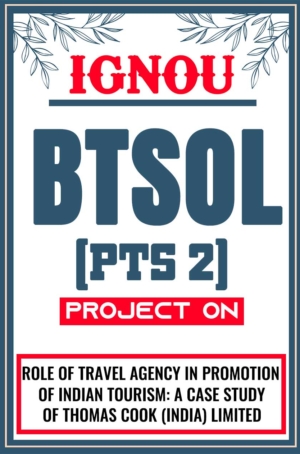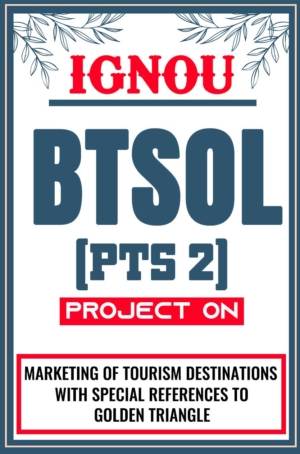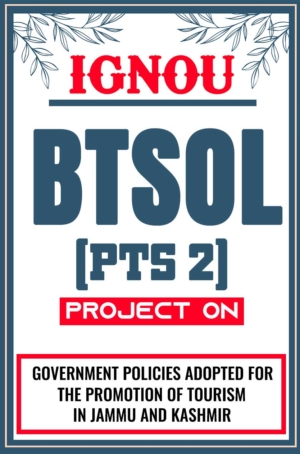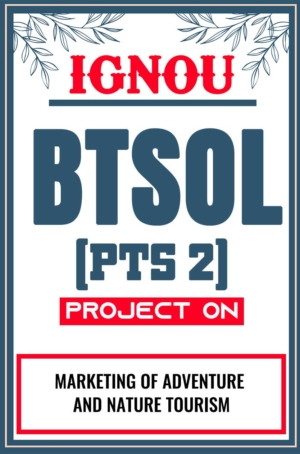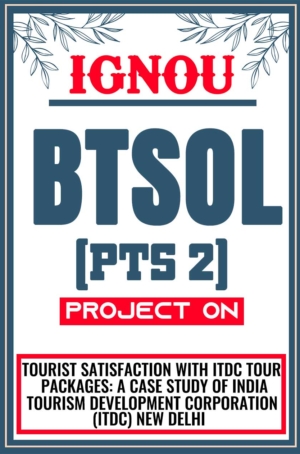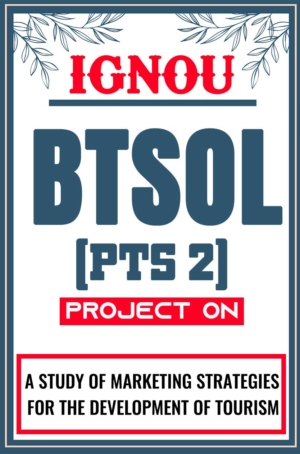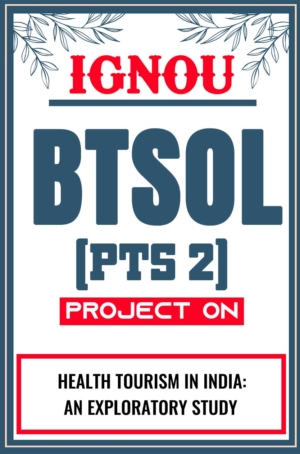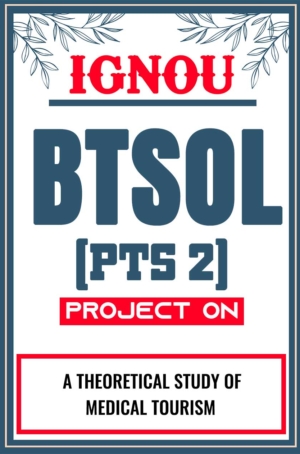Buy IGNOU PTS 2 Project for BTSOL
The IGNOU PTS 2 Project for BTSOL (Bachelor of Arts in Tourism Studies Online) is a practical research component designed to provide students with hands-on experience in the tourism industry. This project allows students to apply theoretical knowledge to real-world scenarios, enhancing their understanding and skills in tourism management.
Students begin by selecting a relevant and feasible topic related to tourism. They then prepare a project proposal, which outlines the objectives, methodology, and expected outcomes. After obtaining approval, students conduct data collection through primary and secondary research methods, such as surveys, interviews, and literature reviews.
Whatsapp us to get the Personalized (Customized) IGNOU PTS 2 Project Report and Synopsis
Download Link for IGNOU PTS 2 Project (BTSOL PDF)
What are the key criteria for selecting a topic for the IGNOU PTS 2 Project?
Selecting a topic for the PTS 2 project in the IGNOU BTSOL program requires careful consideration of several key criteria to ensure the topic is relevant, feasible, and engaging. Here are the key criteria:
Relevance to Tourism Studies
- Alignment with Curriculum: Ensure the topic aligns with the core themes and objectives of the BTSOL program.
- Current Trends: Choose a topic that reflects current trends and issues in the tourism industry.
- Academic Value: The topic should contribute to existing literature and provide new insights or perspectives.
Feasibility
- Access to Data: Consider the availability of primary and secondary data. Ensure you can collect the necessary information within the given timeframe.
- Scope and Scale: The topic should be neither too broad nor too narrow. It should be manageable within the constraints of the project timeline and resources.
- Resource Availability: Assess whether you have access to the necessary resources, such as literature, tools, and research materials.
Personal Interest and Expertise
- Interest and Passion: Choose a topic that genuinely interests you. Passion for the subject can enhance motivation and the quality of your research.
- Background Knowledge: Leverage your existing knowledge and expertise in tourism studies to select a topic you are familiar with.
Practical Application
- Industry Relevance: Ensure the topic has practical implications for the tourism industry, providing solutions or recommendations that can be applied in real-world scenarios.
- Stakeholder Involvement: Consider topics that involve or benefit various stakeholders in the tourism industry, such as tourists, local communities, and tourism businesses.
Originality and Innovation
- Uniqueness: Select a topic that is original and offers a fresh perspective or addresses a gap in the existing research.
- Innovation: Consider innovative topics that explore new ideas, technologies, or methodologies in tourism.
Ethical Considerations
- Ethical Approval: Ensure the topic meets ethical guidelines and can be approved by your supervisor and any relevant ethical review boards.
- Sensitivity: Avoid topics that are too controversial or sensitive, which may pose ethical or practical challenges.
Supervisor and Institutional Support
- Supervisor Expertise: Choose a topic that matches the expertise of your project supervisor, ensuring you can receive adequate guidance and support.
- Institutional Guidelines: Adhere to IGNOU’s guidelines and requirements for project topics to ensure compliance and approval.
Future Opportunities
- Career Relevance: Consider how the topic can enhance your career prospects in the tourism industry, potentially opening up opportunities for employment or further research.
- Networking: Select a topic that allows you to connect with professionals, organizations, and experts in the tourism field.
Samples of IGNOU PTS 2 Project topics for BTSOL
- Effect Of Internet On The Marketing Of Hotels And Tour Operators In City Kolkata
- Marketing Research Of Adventure And Nature Tourism In A Saini Tour & Travels, A Jammu Based Travel Agency
- An Investigation Into The Function Of Internet In Marketing Of Hotels And Tour Operators In Jammu
- Tourist Satisfaction With Andhra Pradesh Tourism Development Corporation (Aptdc’s) Tour Packages
- Jktdc Tour’s Packages — Case Study Of Jammu Region
- Destination Branding In Tourism Industry: A Theoretical Framework
- Marketing Of Adventure And Nature Tourism –
- A Case Study Of Mascot Travels Agency In Kashmir
- Marketing Strategies For The Development Of Tourism In Jammu
What are the primary differences between qualitative and quantitative research methods in tourism studies?
In tourism studies, qualitative and quantitative research methods offer distinct approaches to investigating various phenomena within the industry. Understanding their primary differences helps researchers select the appropriate method for their IGNOU PTS 2 Project study. Here are the main distinctions:
Qualitative Research Methods
Nature of Data:
- Qualitative: Focuses on non-numerical data such as words, images, and observations. It aims to understand the meaning, experiences, and concepts related to tourism.
- Quantitative: Emphasizes numerical data and statistical analysis. It seeks to quantify variables and analyze relationships between them.
Research Objectives:
- Qualitative: Explores in-depth understanding of complex issues, behaviors, and motivations. It is ideal for generating hypotheses and providing detailed insights.
- Quantitative: Tests hypotheses and theories, measures variables, and examines cause-and-effect relationships. It aims for generalizability and objectivity.
Data Collection Methods:
- Qualitative: Uses methods like interviews, focus groups, participant observations, and content analysis. These methods are flexible and can adapt as the study progresses.
- Quantitative: Employs structured methods such as surveys, experiments, and secondary data analysis. These methods are standardized and can be replicated.
Data Analysis:
- Qualitative: Involves thematic analysis, content analysis, narrative analysis, and coding. Analysis is often interpretive and subjective.
- Quantitative: Utilizes statistical techniques such as regression analysis, hypothesis testing, and descriptive statistics. Analysis is often mathematical and objective.
Sample Size:
- Qualitative: Typically involves smaller, non-random samples that are chosen for their relevance to the research question. Sample size is less about quantity and more about depth.
- Quantitative: Requires larger, randomly selected samples to ensure statistical validity and generalizability. Sample size is critical for achieving reliable results.
Outcome:
- Qualitative: Produces rich, detailed narratives and insights that provide a deep understanding of the subject matter. Results are descriptive and exploratory.
- Quantitative: Generates numerical findings that can be presented in charts, graphs, and tables. Results are conclusive and can be used for comparisons and predictions.
Research Flexibility:
- Qualitative: Offers flexibility to explore new directions and insights as they emerge during the research process. The design is often iterative.
- Quantitative: Follows a predetermined research design with specific variables and hypotheses. The design is typically fixed and less flexible.
Strengths:
- Qualitative: Effective for exploring new areas, understanding context, and gaining detailed insights into complex phenomena. It provides depth and nuance.
- Quantitative: Strong for testing theories, establishing patterns, and making predictions. It provides breadth and generalizability.
Limitations:
- Qualitative: Results may be seen as less generalizable due to small sample sizes and subjective interpretations. It can be time-consuming and harder to replicate.
- Quantitative: May overlook the context and deeper meaning of phenomena due to its focus on numbers. It requires large samples and can be costly.
How can you access relevant literature and resources for your IGNOU PTS 2 Project?
Accessing relevant literature and resources for your IGNOU PTS 2 project involves several steps and utilizing various tools and platforms. Here’s a comprehensive guide:
University Resources
1. IGNOU Library:
- Physical Library: Visit the IGNOU library or your study center’s library to access books, journals, and other resources.
- Online Library: Use the IGNOU e-resources portal, which provides access to various academic databases, e-books, and journals.
2. Study Materials:
- Review the course materials provided by IGNOU for your Programme, as they often contain references and further reading suggestions.
Online Academic Databases
3. Google Scholar:
- Search for scholarly articles, theses, books, and conference papers. Use keywords related to your research topic for effective search results.
4. ResearchGate:
- Access research papers and publications. You can also connect with researchers and request copies of papers directly.
5. JSTOR, Springer, Wiley, and Elsevier:
- These platforms offer access to a wide range of journals and articles. Check if IGNOU has subscriptions to these databases.
Public Libraries and Open Access Resources
6. National Digital Library of India (NDLI):
- Provides access to numerous academic resources across various disciplines.
7. Directory of Open Access Journals (DOAJ):
- Offers free access to high-quality, peer-reviewed journals.
8. Project Gutenberg and Open Library:
- Access free e-books and other literary resources.
Institutional Repositories
9. Shodhganga:
- An Indian repository of theses and dissertations submitted to universities in India. It is a valuable resource for literature reviews and understanding existing research.
10. Institutional Repositories of Other Universities:
- Many universities have open-access repositories where you can find theses, dissertations, and research papers.
Professional and Industry Organizations
11. World Tourism Organization (UNWTO):
- Provides reports, publications, and statistics related to tourism.
12. Tourism Industry Reports:
- Access reports from industry organizations such as the World Travel & Tourism Council (WTTC) and local tourism boards.
Books and E-Books
13. Amazon, Google Books, and Project Gutenberg:
- Purchase or access free books related to your research topic.
14. University Presses:
- Many university presses offer free or affordable e-books and research publications.
Reference Management Tools
15. Mendeley, Zotero, and EndNote:
- Use these tools to manage your references, organize your research, and access shared literature collections.
Networking and Expert Consultation
16. Professional Networks:
- Join academic and professional networks such as LinkedIn groups related to tourism studies to connect with experts and access shared resources.
17. Consulting Your Supervisor:
- Your project supervisor can provide guidance on essential readings and suggest specific resources.
How can you address limitations and suggest areas for future research in your IGNOU PTS 2 Project report?
Addressing limitations and suggesting areas for future research in your project report are crucial components that demonstrate critical thinking and understanding of the research process. Here’s a guide to effectively address these aspects:
Addressing Limitations
Identify Limitations Clearly:
- Scope Limitations: Discuss the boundaries of your study, such as geographic, demographic, or temporal limitations.
- Methodological Limitations: Highlight any constraints related to your research methods, such as sample size, data collection methods, or analytical techniques.
- Data Limitations: Mention any issues related to the availability, accuracy, or completeness of the data you used.
Explain the Impact:
- Discuss how each limitation might have influenced your findings. For example, a small sample size may limit the generalizability of your results.
Acknowledge Unavoidable Limitations:
- Recognize limitations that were beyond your control and explain why they could not be addressed within the scope of your project.
Be Honest and Transparent:
- Transparency in acknowledging limitations adds credibility to your research. Avoid downplaying or overstating the limitations.
Provide Context:
- Compare your limitations with those in similar studies to provide context and show that they are typical challenges in the field.
How important is the role of peer feedback in refining your IGNOU PTS 2 Project?
Peer feedback is a crucial component in refining and enhancing your project, especially in an academic context like the IGNOU PTS 2 project. Here’s why it’s important and how it can benefit your work:
Diverse Perspectives:
- Broadens Understanding: Peers often bring different perspectives and insights that you might not have considered. This diversity can help you view your project from multiple angles and identify areas for improvement.
- Spotting Gaps: Peers may notice gaps or inconsistencies in your research that you might overlook, helping to address these issues before final submission.
Improves Quality:
- Enhanced Clarity: Feedback can help refine your writing, making your arguments clearer and more coherent. It can also assist in improving the overall structure and flow of your project.
- Accuracy Check: Peers can help verify the accuracy of your data and findings, ensuring that your conclusions are well-supported and reliable.
Strengthens Argumentation:
- Critical Evaluation: Peers can provide critical evaluations of your arguments and methodologies, helping you strengthen your case and make your arguments more robust.
- Constructive Criticism: Constructive criticism from peers can lead to improvements in your research design and analysis, enhancing the credibility and validity of your work.
Enhances Learning:
- Skill Development: Engaging in the peer review process helps develop critical thinking and analytical skills. It also improves your ability to give and receive constructive feedback.
- Learning Opportunity: Reviewing others’ work provides insights into different approaches and methodologies, enriching your own research skills and knowledge.
Increases Confidence:
- Validation: Positive feedback can validate your approach and findings, boosting your confidence in the quality of your work.
- Improvement: Addressing constructive feedback helps improve the project, leading to greater confidence in the final submission.
Ready to get your IGNOU PTS 2 Project Report and Synopsis Sample PDF for BTSOL?
- Call us or WhatsApp us at: 9958947060, 9354637830
- Visit: SHRICHAKRADHAR.COM
-
Sale!

-
Sale!

IGNOU BTSOL Project (PTS 2) Synopsis/Proposal & Project Report/Dissertation in Hard-Copy (Sample-11)
Original price was: ₹499.00.₹249.00Current price is: ₹249.00. -
Sale!

IGNOU BTSOL Project (PTS 2) Synopsis/Proposal & Project Report/Dissertation in Hard-Copy (Sample-10)
Original price was: ₹499.00.₹249.00Current price is: ₹249.00. -
Sale!

IGNOU BTSOL Project (PTS 2) Synopsis/Proposal & Project Report/Dissertation in Hard-Copy (Sample-9)
Original price was: ₹499.00.₹249.00Current price is: ₹249.00. -
Sale!

IGNOU BTSOL Project (PTS 2) Synopsis/Proposal & Project Report/Dissertation in Hard-Copy (Sample-8)
Original price was: ₹499.00.₹249.00Current price is: ₹249.00. -
Sale!

IGNOU BTSOL Project (PTS 2) Synopsis/Proposal & Project Report/Dissertation in Hard-Copy (Sample-7)
Original price was: ₹499.00.₹249.00Current price is: ₹249.00. -
Sale!

IGNOU BTSOL Project (PTS 2) Synopsis/Proposal & Project Report/Dissertation in Hard-Copy (Sample-6)
Original price was: ₹499.00.₹249.00Current price is: ₹249.00. -
Sale!

IGNOU BTSOL Project (PTS 2) Synopsis/Proposal & Project Report/Dissertation in Hard-Copy (Sample-5)
Original price was: ₹499.00.₹249.00Current price is: ₹249.00. -
Sale!

IGNOU BTSOL Project (PTS 2) Synopsis/Proposal & Project Report/Dissertation in Hard-Copy (Sample-4)
Original price was: ₹499.00.₹249.00Current price is: ₹249.00. -
Sale!

IGNOU BTSOL Project (PTS 2) Synopsis/Proposal & Project Report/Dissertation in Hard-Copy (Sample-3)
Original price was: ₹499.00.₹249.00Current price is: ₹249.00. -
Sale!

IGNOU BTSOL Project (PTS 2) Synopsis/Proposal & Project Report/Dissertation in Hard-Copy (Sample-2)
Original price was: ₹499.00.₹249.00Current price is: ₹249.00. -
Sale!

IGNOU BTSOL Project (PTS 2) Synopsis/Proposal & Project Report/Dissertation in Hard-Copy (Sample-1)
Original price was: ₹499.00.₹249.00Current price is: ₹249.00.

